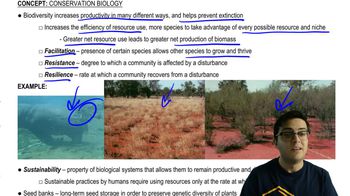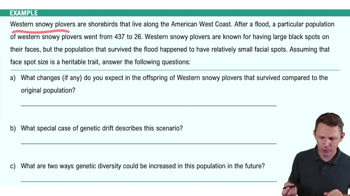Why is the common phrase "humans and animals" not accurate in biology? Suggest one way that a more scientific outlook could boost conservation efforts.

Explain why the construction of wildlife corridors can help maintain genetic diversity in a fragmented landscape.
 Verified step by step guidance
Verified step by step guidance
Verified video answer for a similar problem:
Key Concepts
Wildlife Corridors

Genetic Diversity

Habitat Fragmentation

Biologists claim that the all-taxa survey now under way at the Great Smoky Mountains National Park in the United States will improve their ability to estimate the total number of species living today. Discuss the benefits and limitations that this data set will provide in understanding the extent of global biodiversity.
Some biologists prefer to focus efforts on preserving endangered species while others prefer to focus on preserving ecosystems. What is your advice to biologists, based on the evidence?
The population size of mountain pine beetles in the American Northwest has long been held in check by freezing temperatures during the winters. As winters warm, populations of pine beetles are increasing, killing whitebark pine forest. Grizzly bears rely on the nuts of whitebark pine trees. Do you think climate change is affecting the fitness of the grizzly bear population?
a. No, because climate change is affecting the beetles, not the bears.
b. Yes, because climate change is decreasing the food supply of the bears, which means they will be less strong.
c. Yes, because climate change is decreasing the food supply of the bears, which is likely to reduce their ability to survive or reproduce.
The maps shown here chronicle the loss of old-growth forest (more than 200 years old) that occurred in the United States. In your opinion, under what conditions is it ethical for conservationists who live in the United States to lobby government officials in Brazil, Indonesia, and other tropical countries to slow the rate of loss of old-growth forest?
